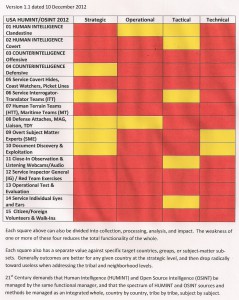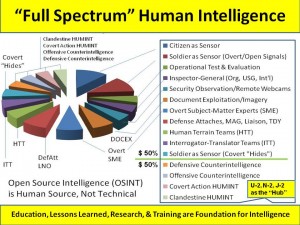
Sigh. Concur with the comments and would add Sumner Shapiro's own finding on the 80-20 rule. Flynn seems to be going the mini-me route, replicating CIA's long-standing failure. Wasted effort and money — and still no focus on the plumbing.
Analysis: Defense Clandestine Service Is Here To Stay
WASHINGTON — Senior US officials and lawmakers are sending new signals that a fledgling cadre of military spies is a done deal, despite no real substantive public debate.
The Pentagon last year proposed creation of the Defense Clandestine Service (DCS), saying the military needed its own team of spies to gather human intelligence across the globe. The country already has a civilian clandestine service within the CIA, which is itching to ditch some of its post-9/11 roles and return full-time to the spying and analysis business.
Yet, despite unresolved questions about operational and budgetary redundancy, Congress rubber-stamped the Pentagon’s plans. And by approving the Defense Department plans as included in its last budget request, so did President Barack Obama, who seems enamored with the country’s myriad intelligence tools.
The conclusion apparently reached by Congress and the administration: Why not add another intel gadget to the toolbox — and slap a military insignia on it?
Ask just about any former Pentagon official or Capitol Hill defense aide what is the biggest hurdle for establishing an entity within the massive DoD bureaucracy, and they almost always will say getting included in the annual budget request, and then surviving the first congressional budget cycle.
DCS accomplished that feat. In recent weeks, including on Tuesday, senior intel officials and lawmakers gave more signals that the military spy cadre is here to stay.
Here are three reasons:
1. High-level support. Director of National Intelligence James Clapper, a former military intelligence official, gushed about DCS during testimony Tuesday before the Senate Armed Services Committee. So did Defense Intelligence Agency Director Lt. Gen. Michael Flynn.
“I am a big supporter of it,” Clapper said. “What this initiative [does], to me, is taking this to the next level. It represents professionalization, greater partnering with the [CIA’s] National Clandestine Service. So I’m a big proponent of it. I think it is a unique capability, particularly the uniform [operatives], and provides a unique service to the national intelligence community that no one else can do.”
Flynn described the military spy agency’s purpose as to “provide human intelligence collection capability for defense and national requirements.
“I would just say that in three areas we have seen significant improvement, and that is our field presence, which we … have expanded our footprint overseas. Primarily the second area is building stronger partnerships, not only with allies and other nations, but also with our services and with, especially, special operations command and, of course, our great partner in the CIA in this endeavor. … We have seen a modest increase in our productivity in terms of reporting and just production from these capabilities that we have put out there over the last year.”
In Washington, if the bigwigs want something — especially ones who run national security entities — they typically get it.
2. Buzzwords. No US defense initiative is real until it’s accompanied by a slew of mind-numbing slogans and government-speak terms. Officials often use them when answering serious, and not-so-serious, questions from lawmakers.
Clapper offered a few.
The new spy cadre, he said, “will help to promote more integration between the two services.”
The DNI said the Pentagon clandestine organization should “actually serve to promote greater integration with the National Clandestine Service.”
SASC Ranking Member Sen. Jack Reed, R-R.I., also got into the buzzword act.
“Gen. Clapper, can you comment on the Defense Clandestine Service [and] its integration with other elements since you’re sitting at sort of the apex of collection activities and other activities.”
In Washington, when your program or initiative gets some buzzwords, it’s a real thing.
3. Congress erected low hurdles. When the leaders of the House and Senate Armed Services committees negotiated a 2014 Pentagon policy bill that was jammed through both chambers in late December, they erected no major hurdles for DCS.
True, the compromise bill includes House-approved language that would require the Defense Department to certify this or that. One such requirement withholds 50 percent of the spy service’s 2014 monies until the Pentagon certifies to congressional national security committees that “DCS is designed primarily to fulfill priorities of the DoD that are unique to the DoD or otherwise unmet; and provide unique capabilities to the intelligence community.”
Such certifications are not difficult tasks for the Defense Department.
The Pentagon policy measure contains other provisions that require “the secretary of defense to design metrics that will be used to ensure that the DCS is employed in the manner certified; provide annual assessments for [five] years based on the metrics established; submit prompt notifications of any significant changes; and provide quarterly briefings on deployments and collection activities.”
Because the department employs scores of workers to craft those kinds of things for Congress, those hurdles are relatively low ones.
Barring a scandal or operational debacle, all evidence suggests DCS is a done deal. ■

ROBERT STEELE: First off, CIA brought this on itself. Over the past quarter century CIA has refused to be serious about defense intelligence requirements at any level (strategic, acquisition, policy, operations) — but in fairness to CIA, DoD has not been serious about these either, preferring to go through the motions and be content with “budget share” and corrupt contracting as the standards by which DoD has chosen to fail. The Defense Clandestine Service is at three strikes and out, it will only get worse. What General Flynn should be doing is cutting the MASINT budget in half and going for a mix of non-official cover mid-career (both US and third country nationals) and multinational clandestine stations fully integrated with multinational open source and analysis units, one for each theater. Anyone seeking to create a clandestine service on a foundation of the civilians now in service, combined with uniforms working from official cover, combined with CIA retreads who have never actually been clandestine, is merely going through the motions.

Anyone seeking to create a clandestine service divorced from the reality that open sources properly managed (not something that can be said of defense open sources) can do 80% of what is needed to support defense strategy, defense acquisition, defense policy, and defense operations; and that nine times out of ten multinational partners will have better indigenous clandestine personnel for street operations, is going through the motions and betraying the public trust. The DCS is a failure now and it will remain a failure for the next 5-6 years, unless there is a sharp redirection. But bluntly, nothing Flynn is doing now is going to pay off in his lifetime, at the same time that there are things he could be doing that would pay off within 90-180 days. [In passing, Flynn knows of me and my views — he has deliberately chosen to go through the motions rather than consider the possibility that there are better, faster, cheaper way of getting to where DoD needs to go.]

See Especially:
Does New Defense Clandestine Service Spell Big Changes for Military Intelligence?
The Pentagon is pulling together hundreds of officers from the Defense Intelligence Agency (DIA) to create an intelligence service called the Defense Clandestine Service (DCS).
PBI: Sheer idiocy. There are no existing officers within DIA with the requisite mind-set, background, or capacity.
House Republicans Signal Support for Cadre of Military Spies
At issue is a Pentagon plan to expand the size and scope its top intelligence arm, the Defense Intelligence Agency (DIA), by adding 1,600 covert operatives.
PBI: Sheer idiocy. Flynn does not know what he is doing, nor does he have anyone reporting to him directly that has a clue how to create a real clandestine service with a larger full-spectrum HUMINT capability.
See Also:
Defense Intelligence @ Phi Beta Iota



